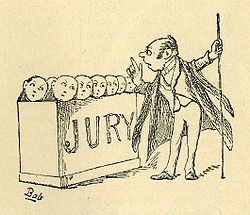US Criminal Law

|
Defenses |

|

|
There are four main types of legal defenses. They are Alibi, Justifications, Excuses and Procedural. |
Alibi[edit | edit source]When a defendant uses an argument based upon an alibi they are not only saying they are not guilty, but they are claiming to be innocent. The alibi is based upon the idea that they could not have committed that crime because they were elsewhere when the crime was committed. Typically in a criminal trial, the defense will attempt to assert proof of an alibi. Such proof can come from documentation of the defendant's whereabouts or testimony of someone who was with the defendant at the relevant time. In law school, this is commonly called the "SODDI" defense..."Some Other Dude Did It". Lawyers call it "alibi." |
Justification[edit | edit source]Justification defense requires the defendant to admit they committed the crime, but they are not guilty because committing the crime was the lesser of two evils. Self defense is the best known of this type of defense. |
Excuse defenses[edit | edit source]The Excuse defenses are based on the idea that the person, while they did commit the crime and the action was not justified, did not have the control or state of mind at the time the crime was committed to be held legally responsible for the crime. Insanity is the best known of the excuse defenses. Also, mitigating circumstances can lead to an acquittal, or a more lenient sentence, if convicted. |
Procedural defenses[edit | edit source]The fourth and least common of the main types of defenses are procedural defenses. Procedural defenses include things such as entrapment, police fraud, prosecutorial misconduct and denial of a speedy trial. These types of defenses argue that the legal system has failed and the person should therefore be released. |
Innovative defenses[edit | edit source]Innovative defenses are somewhat special types of defenses. They are relatively new and untried, with little or no precedent bearing upon them. Previously tried innovative defenses include "Twinkie defense", "black rage", Asperger's Syndrome and urban survival syndrome. Generally, defendants use these defenses to introduce reasonable doubt into the proceedings. Because of this, precedent could be developed, but probably only when judges refuse to admit evidence of these defenses. At that point, the question becomes one of relevance, and a holding on appeal that such evidence is or is not relevant almost always depends on the facts of the cases. As such, it should not be surprising that the reported cases discuss little of these theories. |
